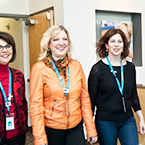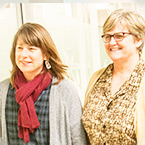Bioethicists Unravel Thorny Issues
As medicine pushes the boundaries of what can be done, Seattle Children’s bioethicists ask what is the best thing to do.
A child in foster care needs an organ transplant but doesn’t have parents or permanent guardians to oversee the complex, long-term care necessary to keep a transplanted organ healthy. Should the child be listed for the scarce resource of a donor organ?
Can parents enroll their 10-year-old child in a research study but not tell her what illness she has?
Should doctors and nurses refuse to work with families who decline to vaccinate their children?
Complicated situations like these illustrate how everyday realities and advancing medical capabilities make it increasingly difficult to know the best course of action when making decisions about care and research.
A national resource
Established in 2005, the Treuman Katz Center for Pediatric Bioethics and Palliative Care at Seattle Children’s was the first program in the U.S. to focus exclusively on ethical issues in pediatric medicine and research. Like many healthcare institutions, Seattle Children’s has long had providers on hand to help clinicians, researchers, patients and their families arrive at mutually acceptable solutions to complicated medical situations that don’t have easy answers.
Seattle Children’s wanted to take it further – to be a national resource for stimulating discussion, research and problem solving about the complex medical circumstances that affect families, healthcare institutions and society.
Aiming the pediatric lens
The key factor that distinguishes pediatrics from general medicine is that the patient is not the medical decision-maker.
“There’s a triangular set of relationships in pediatrics among the provider, the parents and the child – and these relationships are dynamic,” says Dr. Ben Wilfond, a lung specialist who also leads the Treuman Katz Center. “How the child will be tomorrow is different than how they are today. We have to think about them differently and involve them differently as they grow and change. The challenge is to find the balance between what is in the child’s interest while respecting what the child wants and what the parents want.”
Broaching tender topics
 Seattle Children's Hospital Guild Association Board of Trustees members (from left) Carol Fleck, Judy Ogden and Debra Cady prepare for a Funding Hope committee meeting to discuss future funding opportunities for programs that promote the health and well-being of children in our region.
Seattle Children's Hospital Guild Association Board of Trustees members (from left) Carol Fleck, Judy Ogden and Debra Cady prepare for a Funding Hope committee meeting to discuss future funding opportunities for programs that promote the health and well-being of children in our region.
Improving how clinicians engage patients and families in discussions about care decisions is Dr. Doug Opel’s goal.
Opel, a general pediatrician and bioethicist at Seattle Children’s, is currently studying the childhood vaccine decision. In a recent study, he found that physicians usually try one of two approaches with parents: a presumptive approach that assumes parents are fine with having their child vaccinated or a shared decision-making approach that invites the family to participate in the decision. While the shared decision-making approach “feels” better, he found that fewer parents agreed to the vaccines recommended for their child.
“Shared decision-making has become the default approach in medicine today. It improves parental involvement in decision-making and extends the principle of informed consent. That said, there isn’t very convincing evidence that it improves outcomes,” notes Opel.
He is now working beyond the specific context of childhood vaccines to identify specific criteria that might indicate whether a shared decision-making approach is appropriate to use with parents.
“There’s a moral component to every interaction we have as care providers – whether it’s as everyday as ‘how do I respond to a parent’s refusal of immunizations,’ or as severe as ‘is this the right time to withdraw life support,’” notes Opel. “Developing the evidence-based tools needed to navigate the concerns and situations that parents and providers face is one way to help children and their families.”
Training nurses as bioethics consultants
 The Nursing Bioethics Liaison Program, led by veteran nurses Kristi Klee (right) and Leah Kroon, is aimed at helping nurses feel better equipped to work through challenging issues with families and other providers.
The Nursing Bioethics Liaison Program, led by veteran nurses Kristi Klee (right) and Leah Kroon, is aimed at helping nurses feel better equipped to work through challenging issues with families and other providers.
The patient population at Seattle Children’s continues to shift to children who have chronic conditions, require complex care, and rely on expensive technologies. All of these factors contribute to the complicated ethical issues that can arise during their care.
Support from Seattle Children’s Guild Association’s Funding Hope program will develop an innovative Nursing–Bioethics Liaison Program to coach nurses in negotiating the complex ethical issues that impact families.
“Our nurses are amazing and help many families face emotional, life-changing dilemmas,” says Judy Ogden, chair of Seattle Children’s Guild Association Board of Trustees. “We hope this program will help them feel better equipped to work through challenging times with families and other providers.”
Long-time nurses Kristi Klee and Leah Kroon will lead the program and spearhead the involvement of nurses on each unit.
“Few children’s hospitals emphasize the role of nursing in bioethics,” Ogden notes. “We want this program to be a model for improving patient care and outcomes.”
Published in Connection magazine, Spring 2016